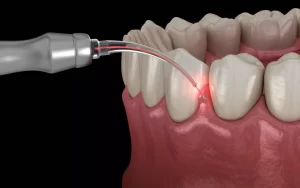
Gum Irritation: Symptoms and Treatments
Gum irritation is a common dental issue that occurs due to various causes and influences your comfort level and dental status. The awareness of the most frequent symptoms and existing treatment options provided by Leduc general dentist is essential to promote patient outcomes and quality of life. This paper will describe the diversity of underlying disturbances and try to encourage related patients by sharing this information.
Symptomatic Patterns
Irritated gums are typically erythematous and inflamed in appearance. Patients may consider them swollen or puffy, and touching and brushing can lead to unpleasant feelings. Blood discharge during the interaction and teeth brushing is another common symptom. Other people may report soreness whenever they feel pressure in the form of food chewing. In some cases, the gums may rectify and reveal more enamel, which can cause a patient to feel sensitivity in teeth.
Treatment Options
Improving Oral Hygiene: Flossing daily and using antimicrobial mouthwashes are important aspects associated with promoting patient outcomes.
Professional Dental Cleanings: Patients have to undergo proficient teeth cleaning every six months to eliminate plaque and tartar and reduce chronic inflammation. Moreover, some of these preventive activities can simultaneously help to treat advanced conditions.
Scaling and Root Planning: It is a deep cleaning procedure that removes plaque and tartar from below the gum line, where regular brushing and flossing techniques cannot reach
Lifestyle changes: Do not smoke or use tobacco products; they can irritate your gums further and increase your risk of disease. Consume a healthy diet of fruits, vegetables, and whole grains while avoiding too much sugar and acidity.
Warm salt water rinses: This can help to reduce inflammation and aid in healing. To produce the rinse, mix a half teaspoon of salt into a glass of warm water, rinse it around in your mouth for 30 seconds, and then spit it out.
Over-the-counter pain relief: Over-the-counter pain relievers can help to reduce both discomfort and inflammation. Ibuprofen and acetaminophen are two examples.
You should see a dentist if you experience persistent gum irritation or any of the following symptoms.
- Persistent redness, swelling, or tenderness of the gums
- Bleeding gums when brushing or flossing
- Gums that are retracting or teeth that are loosening
- Infection or discharge from the gums.
Gum irritation is a frequent oral condition that may occur to anyone and might cause discomfort in the mouth. It might be prevented by understanding its signs and treatment alternatives.



